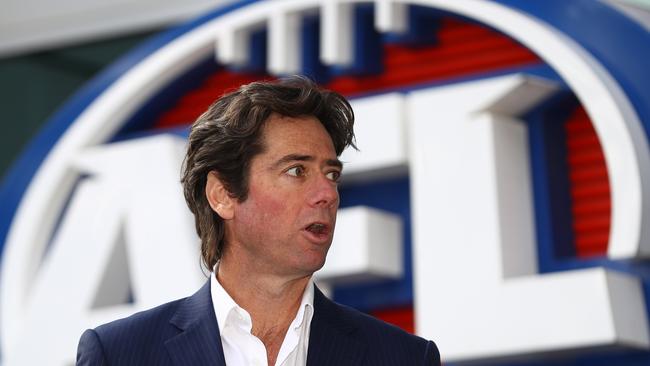AFL workers call on unions for help as cost-cutting drags on
The latest twist in the AFL’s savage cost cutting plans has unions being called in for staff fighting to save their jobs.

Disgruntled AFL staff have turned to the unions in a bid to save their jobs.
The league stood down about 80 per cent of its workforce in March and many have been told they will be required to reapply for their positions.
Seventeen staff have engaged the United Services Union in NSW, while the Victorian branch of the Australian Services Union will represent workers based at AFL House in the Docklands.
Both unions say they will be demanding a seat at the negotiation table and are prepared to take potential disputes to the Fair Work Commission.
The league has repeatedly refused to disclose how many staff it employs, but hundreds of jobs are set to be slashed under a savage cost-cutting plan aimed at delivering a “leaner, faster, stronger and more focused” AFL administration.
United Services Union general secretary Graeme Kelly said AFL workers were becoming increasingly frustrated.
“The AFL claims a commitment to social justice and equality, but they are failing to uphold those values with their treatment of the loyal staff who work tirelessly behind the scenes,” Kelly said.

“AFL management are responsible for the current financial crisis — they failed to put money aside from the rivers of gold that flowed during the good years — and now staff are being forced to pay the price.
“While players, through the AFL Players’ Association, have been given a seat at the table when big decisions are being made, that same consideration is being refused to staff.
“Staff deserve to be at the negotiating table, with a strong collective voice through their unions, rather than the current situation where secretive decisions are imposed by AFL management.”
Australian Services Union Victorian private sector branch secretary Matt Norrey said AFL staff feared management “was looking to use the COVID-19 pandemic as cover to slash up to 60 per cent of their workforce”.
“While some of the 80 per cent of staff stood down in the early days of this crisis have returned to work, AFL management appear to hope others will simply give up and resign, rather than come back to work or receive genuine redundancies,” Norrey said.
“Staff report being asked to ‘re-pitch their talent’, effectively forcing them to justify keeping their current jobs, without any transparency about how the process is operating.
“Management are hiding behind confidentiality to avoid giving information to staff about their future, adding to the uncertainty and stress around job security.”
MORE AFL NEWS:
AFL teams: All the ins and outs for Round 9
Four AFL clubs hit with fines totalling $185,000 for COVID breaches
AFL to rethink fixtures after Round 13 due to player welfare concerns
An internal document leaked last month detailed the league’s plan to streamline its bureaucracy and create what it has declared will be a “new AFL”.
It outlines a vision for a more “talented and empowered team of all-rounders” who were “collaborative, aligned and inspired by a shared purpose”.
“We will have a leaner structure with less roles,” the document states.
“Many roles will be impacted based on changes to what programs, products and services we continue, do differently or stop.
“While we will keep some specialist roles there will be more generalist roles – with multiple responsibilities.”
AFL staff wages topped $115.6m in 2019, but an official headcount is no longer divulged in the league’s annual report filed with the Australian Securities and Investments Commission.
The AFL — a not-for-profit organisation which does not pay tax — operates about a dozen departments, including the office of the chief executive, football operations, game development, legal and integrity, commercial operations, corporate affairs, finance and broadcasting, infrastructure, major projects and investment, inclusion and social policy, AFL Media, strategy and human resources.
Its 12-person executive team pocketed $10.56m in combined salaries last year, an average of $880,000.
The AFL says staff who are continuing to work have taken a minimum 20 per cent cut, while others are earning 40-60 per cent less.


